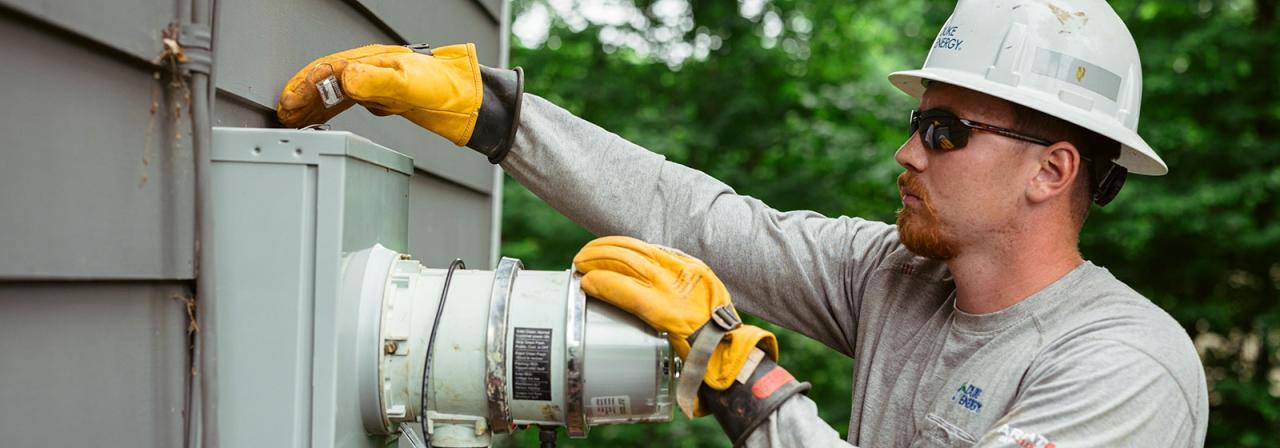With help from community colleges and other organizations, Duke Energy is developing a new generation of skilled lineworkers
NORTHAMPTON, MA / ACCESSWIRE / July 2, 2024 / Duke Energy

By Virginia Brown
After three years stationed in Guam with the U.S. Navy, Harrison Cochran arrived home. He wasn't sure what post-military life would look like, but the 24-year-old knew he had a whole career ahead of him.
"I knew I wanted to get into trade work," Cochran said, "or some type of on-the-job training."
He considered a welding program, having served as a welder in the Navy. But his father and uncle worked as low-voltage electricians, and they urged him to consider line work.
"They told me that becoming a lineworker was the way to go," he said.
Then Cochran learned about a lineworker training program at Cape Fear Community College">lineworker training program at Cape Fear Community College through the Department of Veterans Affairs. It was close to home. Having grown up in Snow Camp, N.C., he was familiar with Wilmington, N.C., where CFCC is located.
Cochran enrolled in the 10-week program, knowing it could set him on a path to a stable career with a competitive starting salary - and at a fraction of the cost of a four-year degree.
"A couple of guys from my high school had gone through the same program," he said, "and they had all good things to say about it. When I got there, I found that they were right."
Lineworker careers
Demand for lineworkers is expected to climb by 8.5% by the year 2026, with an estimated 21,500 job openings in 2024 alone, labor statistics show.
Duke Energy hires lineworkers in every stage of their career, from line apprentices to experienced journeymen. Check current openings - or find training for a career in line work - on our website.
Cochran got a job at Duke Energy after graduating from CFCC's electrical lineworker training program in June 2023. Today, he works on a team of experienced lineworkers, learning how to troubleshoot power outages and make necessary repairs to keep the lights on for customers.
"[Harrison's] leadership qualities stood out," said Seth Caison, Cochran's supervisor at Duke Energy's Fairfax Operations Center in Greensboro, N.C. "He showed initiative, and presented ideas in ways that would benefit the team, not just himself."
His journey is hardly an isolated case. In 2023, 41% of Duke Energy's entry-level apprentice lineworker hires were graduates of the company's partner community colleges. And many of the line apprentices earn a starting salary of nearly $50,000, plus benefits.
"Much of the existing workforce is approaching retirement, so there's a critical need for highly skilled workers," said Isabel Nieto, manager of workforce development at Duke Energy. "We've been creative about investing in new talent, relying on our community colleges and other organizations to help ensure there's a steady pipeline of workers to fill these much-needed roles both at Duke Energy and across the country."
CFCC's industry-recognized program is one of more than 20 programs that Duke Energy has invested in across the Carolinas, Florida, Ohio, Indiana and Kentucky.
"These colleges are closely connected to their communities," Nieto said. "They broaden our reach to individuals who may have never thought of this career before and help deliver a skilled, diverse pipeline of potential lineworkers."
Since inception, CFCC has graduated nearly 900 students from the program, partnering with over 15 employers.
"We have great instructors with years of experience," said Emily Holt, director of Workforce Readiness Programs at CFCC. "Each instructor has 30- to 40-plus years of industry experience."
In addition to a $200,000 initial startup grant from the Duke Energy Foundation in 2018, Duke Energy continues investments annually through scholarships, smaller grants and marketing. Holt said the company's name recognition is another leading reason for the program's success.
"A lot of students feel a pull to work at Duke Energy," Holt said.
"The company has a really good reputation, and the students come in having heard that it's a great company to work for. They get excited when they know that Duke is one of our big partners, and it increases the quality of our program."
CFCC's lineworker training program also provides students with a commercial driver's license, or CDL, which allows them to operate utility trucks.
"A lot of schools don't offer CDL. You have to get it yourself," Cochran said. "So that was great. It takes the stress off the students by providing that during school."
In Wilmington, proximity to North Carolina military bases, like Fort Liberty (formerly Fort Bragg) in Fayetteville and Camp Lejeune in Jacksonville, is an added bonus for companies that recruit lineworkers.
"Given the focus on safety, teamwork, reliability and responsibility, these roles are very appealing to and a very good fit for former military," Nieto said. "They have what it takes to be successful."
Caison agrees. "With [Harrison's] background as a welder in the Navy, he came in exactly how you would hope every new hire would. He is constantly on top of the work, figuring things out and learning. He has a bright future with the company."
Cochran thinks so, too. "I've been really lucky to find something I enjoy."
View original content here.
View additional multimedia and more ESG storytelling from Duke Energy on 3blmedia.com.
Contact Info:
Spokesperson: Duke Energy
Website: https://www.3blmedia.com/profiles/duke-energy
Email: [email protected]
SOURCE: Duke Energy




